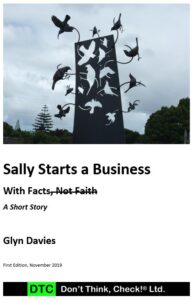Starting A Business – With Facts, Not Faith
Hi,
Glyn with a ‘y’ from Don’t Think, Check!® Limited again.
This is the second episode in a series called Starting A Business – With Facts, Not Faith.
In this episode, I present the facts of business.
The Facts of Business
As with the facts of life, there are facts of business.
What I’m about to tell you won’t make me popular, and it runs counter to the follow your passion mantra that is popular and common-place in books and on the internet.
But I don’t have any motives other than to tell you the truth as I understand it. And the truth is, I’d be better off financially if I banged the follow your passion drum too but added that your path to riches is through me, I’ll show you how. Simply subscribe to my – Your Path To Riches Seminar for only $1,545!
But I’m not going to do that.
Here’s some more facts:
- Many startups fail. Starting a business is a big tough job, much bigger and tougher than first-timers realise. The failure rate of Small to Medium Enterprises (SME, fewer than 19 employees) is approximately 50% in 5 years, Small Business Factsheet 2017, Beehive.govt.nz. And from Strategyzer, 42% of startups fail because they work on products that no one needs and 72% of new products don’t meet the revenue expectations.
- Not everyone has the right temperament or skills or enough resources such as money and contacts.
- Not everyone has something that people in enough numbers want to buy at the price you need.
- No one knows everything that you need to start and then run a business.
- No one can do everything that is required to start and then run a business – there are only 24 hours in the day and you have to use some of those for sleeping.
- You will need to buy help and it is likely that your business cannot afford to hire that help either in the short or the long-term.
- We live in an indifferent universe, on an indifferent planet, that doesn’t care if your startup succeeds or fails. There are no universal rules about what is fair if you, a really good person, give it a good go.
I’ll get to the Factors for Success shortly, but here’s yet more facts.
Following the rules that follow will not guarantee you success. What they will do however is:
- Improve the chances of success by:
- Telling you what a business needs.
- Following a structured process.
- Avoiding the most obvious of risks.
- Reduce the magnitude of your losses if your startup is not successful.
But before we get to that, let’s talk about learning.
It’s about learning
If you haven’t done something before, and you really really want to do it, then you’ll need to learn how to do it.
No surprises right!?
I know not everyone is wired like me. Whereas some people seek out gratuitous fun, I actively seek out knowledge; I know, sad right!
But this brings me to my point, finally. I know nothing about you. If you’re going to try to start a business, you’re by definition going to have to learn stuff. You need to be aware of how you learn. Is it by reading, listening, watching, doing, or some combination of all of those? There’s no one right way for everybody, but there is a right way for you.
For me, apart from the simplest of tasks such as making a bed or hanging up the washing, I swing towards 80% reading and 20% doing.
Watching is good for me too if there’s the opportunity.
I’m wired this way because I have a tendency to want to know how things work. This is not an obsession, simply a tendency; there’s a difference.
And why is that? It’s because when things are important, such as starting a business, I want to know that if I act appropriately, tick the boxes, I will get predictable and repeatable results. It’s of little value to me to wander about guessing and consigning my results to luck, even if those results are this time beneficial. I want to know where the limits are, that is, how things work, why they work, that the results are reliable and predictable, and when they will stop working.
In effect, what I am doing by learning and following a structured process is managing risk, as opposed to straight out gambling.
Desirable results are not necessarily guaranteed by following a structured process, only more likely, or at least we’ll minimise our losses.
The material that I will produce will be a combination of watching and reading, with a big emphasis on reading. It’s easier that way to get the words into an order that might make sense and be useful and actionable for you.
There are some similarities to starting and then running a business and a sports game such as netball. If you’re passionate about playing netball, there are some things that you are going to have to learn, such as the rules, team work, position on the court, catching the ball, and passing the ball.
You’re also going to need money to buy a uniform, socks, appropriate shoes, and for transport to practice and games.
It’s similar with a business; there are rules about how things really work, similar to the rules of nature and just as unforgiving, and there are other rules called laws we have to abide by such as paying your bills when they fall due, that is, not trading while insolvent.
You’re going to have to find a position in the market for your product, service, and experience bundle, what I call a solution. You’re going to have to learn about how to buy what you need so that you can process it and then you’ll need to learn how to sell the resulting solution.
You’re also going to have to spend time and money on marketing – people need to know that your solution exists, what it’s for, and how they can get it.
If you don’t know how to play the game of business or there are aspects you don’t know about, you need to:
- Learn how to do it.
- Get someone to help you learn how to do it.
- Get someone to do it for you.
- Stop and do something else if you can’t do any of the above.
Seriously, if you for whatever reason, can’t or won’t learn what you need to start and then run a business, then just stop kidding yourself. Ignore what your family and friends are saying about follow your passion. Go do something else, save your money, your credit rating, your time, and relationships.
Being imperfect humans, we’re unlikely to get things right the first time we try. We need to embrace this fact and look forward to our lessons as stepping stones to a higher level of knowledge and expertise.
| Example: I’ve had a few clients now that were low on cash and cash flow, but in my view at the time, could have really benefited from a couple of Good Samaritans in the form of a lawyer and web designer willing to pay it forward by working for free to help the clients to get on their feet. While I still haven’t completely dismissed the theory, based on observation, that some suppliers of services are predatory in their behaviours, meaning that they will provide and charge for goods and services despite it being readily apparent that the client’s business is doomed, I have by consulting with peers, come to a somewhat different view. Using the game of Netball as a metaphor for running a business, if you cannot afford to buy a ball, you shouldn’t be trying to play a game. With business, if you haven’t got a source of funds to pay for accountants, lawyers, website development, and bills when they fall due, and you can’t do it all yourself, then you’re not in the game! Get off the court! |
In the next episode, I’ll be talking about businesses failing.
#DontThinkCheck #BusinessResultant #StartMyBusiness #RunMyBusiness #SeeANeedFillANeed



